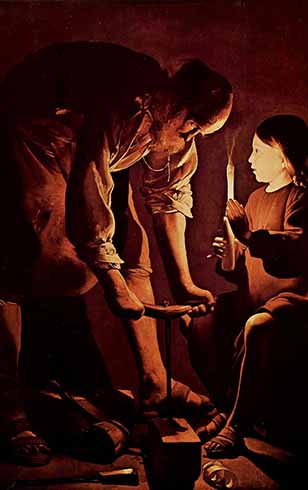 For someone who is mentioned mostly in the infancy of Jesus, and later only in passing, St Joseph, the foster father of our Lord, has enormous responsibilities of patronage in the Catholic Church: for unborn children, fathers, immigrants, workers, employment, explorers, pilgrims, carpenters, engineers; against doubt and hesitation; and of a happy death. Pope Pius IX declared him patron of the entire Church, and many countries have also taken him on as their national patron.
For someone who is mentioned mostly in the infancy of Jesus, and later only in passing, St Joseph, the foster father of our Lord, has enormous responsibilities of patronage in the Catholic Church: for unborn children, fathers, immigrants, workers, employment, explorers, pilgrims, carpenters, engineers; against doubt and hesitation; and of a happy death. Pope Pius IX declared him patron of the entire Church, and many countries have also taken him on as their national patron.
Because he is such a towering figure, but only featured when directly pertinent to Jesus’ story, there has been much historical speculation about Joseph. He may have been a widower with children by a former marriage to a deceased wife; he may have been very old; he may have had a medium-sized business with artisans working under him; he may have contributed to the rebuilding of a major city, Sepphoris, after the Romans ravaged it in the early first century CE.
None of these speculations capture what is steeply admirable and inspiring about the saintly husband of the Mother of God.
Joseph’s most dramatic roles are mentioned in the Gospel of Matthew. He was a compassionate man who bravely acquiesced to the will of God when he learned that Mary, his betrothed, was with child to the Holy Spirit. Rather than subject her to the mauling ignorance of the local mob – so ready to demonise unlawfully pregnant women – he proceeded with the marriage for her sake.
As a refugee from the political violence of Herod, he led his young family to safety in Egypt, thereby saving in infancy the future Saviour of the world. Arguably, he saved Him again by re-settling in Nazareth to avoid the possible threat of deceased Herod’s newly empowered, and no less feared, son. In all these actions, Joseph comes across as stalwart, cautious by quiet deliberation, and responsive to the guidance of God, whom he clearly saw as his role model for loving fatherhood.
But how was Joseph regarded, independently, for his own profession of ‘carpenter’?
What did ‘carpenter’ mean? The Greek word used is ‘tekton’, which could suggest a man who worked with wood, but perhaps with metal or stone; and one connotation is that he might also have been a man learned in the Torah. Was he a small-time village artisan, or was he someone who might be called on for major projects in the Sepphoris rebuilding?
A clue comes in the Gospel of Matthew. When Jesus returned to Nazareth with a reputation for holiness and healing, and began preaching in the synagogue, the locals showed a note of amazement: ‘Where did this man get this wisdom and these miraculous powers? … Isn’t this the carpenter’s son?’ (Matt. 13: 54-55). This suggests two things: one, that they didn’t think Joseph would have passed on any great learning about the Torah; and two, that Joseph probably didn’t hold the sort of status that a medium-sized business owner would have held. Joseph seemed mundane to them, in contrast to Jesus, whom they also disdained in spite of His reputation.
But in Mark’s Gospel, another dimension is added, for they didn’t only say, ‘Isn’t this the carpenter’s son?’ but also, ‘Isn’t this the carpenter?’ (Mark 6:3).
Thus, we learn that not only did Joseph lovingly protect a child not his own in His infancy, not only did he work to feed, house and clothe Mary and Jesus, not only was he therefore an excellent example of Earthly fatherhood to the Son of God, but he also gave the Saviour a profession, and thus practical experience in the central human dignity of work.
Feast day: 19 March
Image: St Joseph the Carpenter, by Georges de La Tour. Wikimedia.